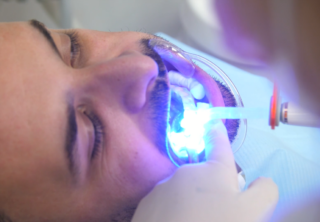What is Dental Teeth Whitening?

Teeth whitening is a medical procedure that lightens the natural colour of your teeth without damaging them.
The bleaching agent is made of hydrogen peroxide or carbamide peroxide. The whitening gel will come into contact with the tooth surface, and it will penetrate the enamel and dentine.
This will release molecules and oxidise the pigments, lightening the shade of the teeth. Teeth Whitening includes substances that prevent dehydration and increase colour resistance due to substances, such as fluoride and potassium nitrate, which strengthen tooth enamel, reduce sensitivity and prevent tooth decay.
Is Teeth Whitening safe and effective?
There are various techniques, materials, and products available in dental clinics. If correctly and safely used, it will produce very effective and amazing results.
There are various Teeth Whitening products for sale in supermarkets and advertised on TV. Generally, these products are less effective, because the substances for sale at the dentist’s office cannot be bought at the supermarket. There is no control regarding these substances, which makes them less reliable.
What types of Teeth Whitening are there?
There are two types of Teeth Whitening: the ones carried out at home and those carried out at the clinic.
Dental whitening at home:
The dentist will create a custom-made acrylic mouth guard based on the patient’s mouth, which fits closely to your teeth when worn. These mouth guards are produced with special vacuum machines. Mouths guards contain the whitening gel and are placed in the mouth. The whitening gel is applied for 7 days, or 15 days at the most, for a few minutes at a time.
Custom-tailored mouth guards have the advantage of fitting the teeth perfectly and, therefore, will use less chemical products.
Dental whitening at the clinic:
External Bleaching: Includes light activated and laser instruments. Lips, gums and mucosa are protected and gel is placed on the outer surfaces of your teeth. This light-activated gel will whiten your teeth. Teeth Whitening can be done in a single session and has immediate results. However, it is considerably more expensive than the one carried out at home.
Internal Bleaching: When a tooth is discoloured due to tooth decay, root canal treatment, or trauma, the dentist can carry out internal bleaching, activating its effect with heat or light. This procedure is performed in various sessions until the desirable results are obtained. Depending on the case, Internal Bleaching can last a few years, but, over time, you will need to repeat the procedure.
Are there any adverse effects?
Everyone can have Teeth Whitening if there is no tooth decay This procedure is not recommended for those with extensive restorations because the gel will only bleach natural teeth. It is not recommended during pregnancy or for breastfeeding mums and children. There are no known cases in which teeth whitening would have adverse effects on a baby’s health. Nevertheless, as a precaution, it is better to have teeth whitening before or after the pregnancy.
Can it damage tooth enamel?
If this procedure is carried out at regular time intervals and with certified products, it will not cause any damage to the enamel. Medical indications should be followed during this period. It is important to read the information leaflet in the product package if you are doing this procedure at home.
Can it cause sensitivity?
It may cause temporary sensitivity in some people. If you experience high teeth sensitivity, you should reduce the application of the mouth guards or the duration of the light-activated procedure. You can also use gels with fluoride and potassium, which will help to reduce these symptoms.
Why does teeth colour darken?
- Some people are born with yellowish teeth. For others, teeth will get darker with age.
- The original colour of the teeth may change due to various factors, including tobacco, coffee- drinking habits, specific foods, tartar build-up, etc.
- Antibiotics can cause internal stains. Ageing will also contribute to the darkening of teeth.
- Root canal treatment can cause teeth darkening.
What should I eat during the Teeth Whitening treatment?
Some foods should be avoided. During the necessary time for Teeth Whitening, you should avoid coffee, tea, wine, strawberries, beets, blackberries, and carrots. After treatment, you can consume these items, but remember to always brush your teeth after meals.
How long will the effects of teeth whitening last?
It can last from one year to four years, depending on the person’s eating and social habits. If you are a non-smoking person and avoid drinking liquids that will stain your teeth, such as wine or coffee, you will be able to keep your teeth white for a long time.
VitaCentre Medical Reference . Reviewed By Dra. Filomena Santos, Dentist, in July 22, 2022

